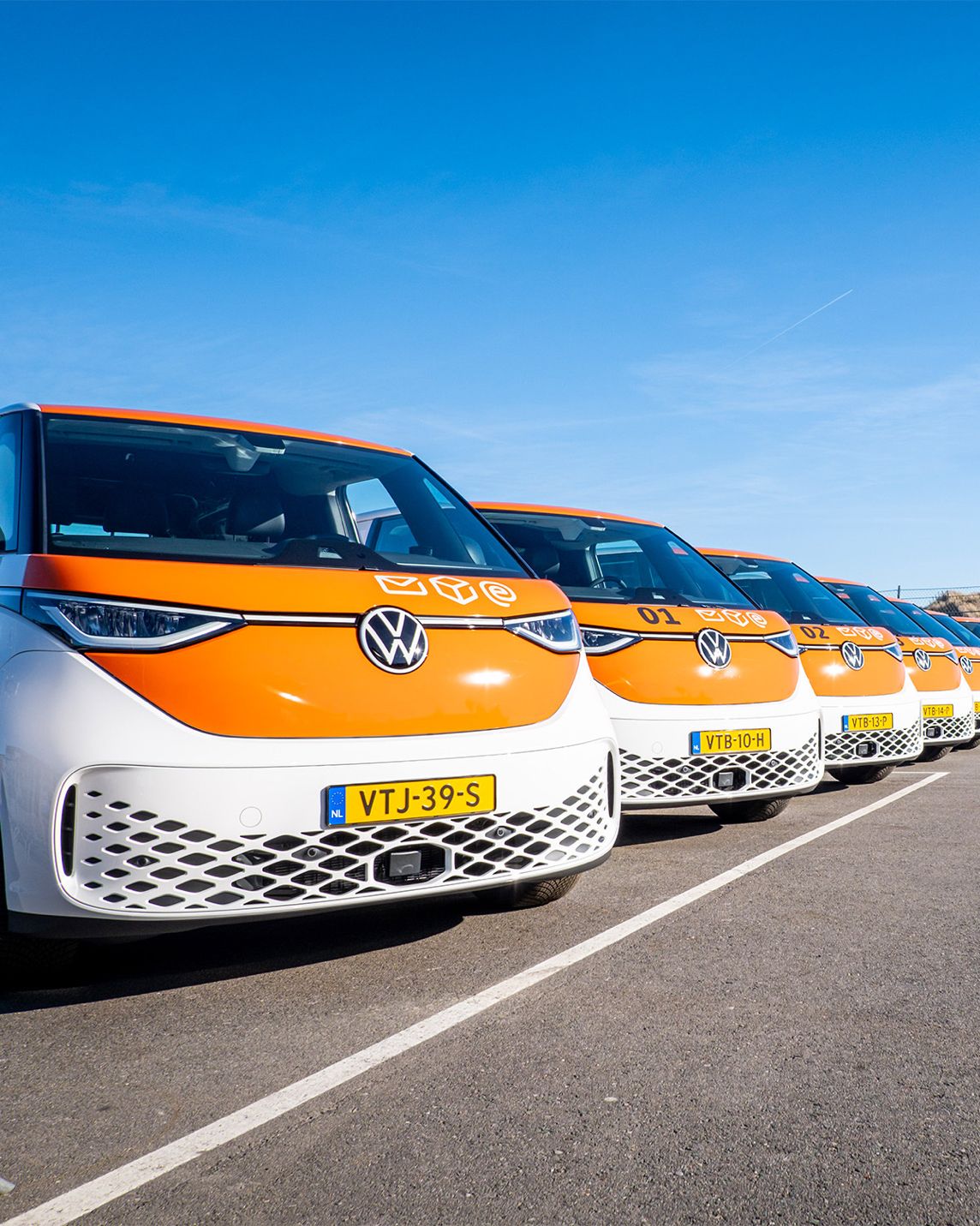The Postal Service’s new delivery vehicles aren’t going to win a beauty contest. They’re tall and ungainly. The windshields are vast. Their hoods resemble a duck bill. Their bumpers are enormous.
“You can tell that (the designers) didn’t have appearance in mind,” postal worker Avis Stonum said.
Odd appearance aside, the first handful of Next Generation Delivery Vehicles that rolled onto postal routes in August in Athens are getting rave reviews from letter carriers accustomed to cantankerous older vehicles that lack modern safety features and are prone to breaking down — and even catching fire.
Within a few years of the initial rollout, the fleet will have expanded to 60,000, most of them electric models, serving as the Postal Service’s primary delivery truck from Maine to Hawaii.
Once fully deployed, they’ll represent one of the most visible signs of the agency’s 10-year, $40 billion transformation led by Postmaster General Louis DeJoy, who’s also renovating aging facilities, overhauling the processing and transportation network, and instituting other changes.
Love to see these, and I’m glad the people actually using them are liking them.
Article could have done without this hand job for DeJoy, though:
Once fully deployed, they’ll represent one of the most visible signs of the agency’s 10-year, $40 billion transformation led by Postmaster General Louis DeJoy, who’s also renovating aging facilities, overhauling the processing and transportation network, and instituting other changes.
DeJoy had to be pressed to not go forward with the purchase of new gas-powered ones, so I would hardly attribute this to him:
The Environmental Protection Agency (EPA) and climate hawk Democrats in Congress are pressing Postmaster General Louis DeJoy to backtrack on the purchase of thousands of gasoline-powered U.S. Postal Service vehicles,
The line about “renovating aging facilities”, overhauling the logistics network, and “instituting other changes” has quite a bit of whitewashing as well:
Last March, the Postal Service unveiled a 10-year cost-cutting plan that would involve the closure of 18 mail-sorting facilities nationwide, consolidating the closed facilities’ services to other cities in their regions. The plan sparked outrage within the American Postal Workers Union, with leaders saying the planned cutbacks and consolidations would hurt service.
Don’t forget all the sorting machines he trashed right before the last election
Also please remember that anything good Dejoy does is just the minimum required to keep him off the Biden administration’s shit list so that he can keep securing contracts for XPO - the private shipping carrier he still has financial ties with.
DeJoy had to pressed to not go forward with the purchase of new gas-powered ones
Did you mean to say electric ones? IIRC Dejoy was for new trucks but not electric trucks.
DeJoy had to be pressed to not go forward with the purchase of new gas-powered ones.
I did leave out “be” in that sentence lol. I’ll fix the original comment. But yeah, that’s right: he was going for a fleet of gas-powered trucks and had to be pressed to order the electric ones.
Ah! See my brain instead of adding “be” dropped “to” 🤣
DeJoy had pressed to not go forward with the purchase of new gas-powered ones
This is awesome. We still need to get rid of LeJoy.
I have no idea how he’s still there.
The president can’t directly fire him, and inexplicably hasn’t used the indirect means available (appointing new members to the board of governors who would do the needful).
Basically the governors on the board like him, the senate will fight any appointments, and Biden cowed him over the electrical vehicles already, so it was largely a win, somewhat a loss as is.
Initially the new vehicles were going to be like 90% gas, 10% electric. Biden forced him to flip to almost all electric.
I’ll be blunt: the EV win is going to be categorically meaningless if DeJoy ends up fucking with mail in ballots enough that it makes an impact on the result of the election
It’s a small win orthogonal to that.
Thanks, this is super useful context. I was also scratching my head how something broadly positive was coming out of De Joy, who has certainly worked to dismantle USPS from what I remember.
It’s in spite of him, not from him.
Well actually, now he can. “Official act, fuck you.” (per Trump v. United States, No. 23-939)
But only if he assassinates him, right?
I mean, yeah, that’s one way to “fire” someone.
Also: is an assassination if it’s an “official act”?
Why wouldn’t it be?
Biden used his direct power to cancel student debt for a lot of borrowers and the Supreme Court illegally blocked it so laws are meaningless in this country.
From what I’ve seen he is doing a lot of good.
He tried to get them to mainly use gas powered hybrid ones. Which sounds great on the surface, but they basically got the same mpg as the now at least 30 year old LLVs they were replacing, just with AC. When that fact was put out, these fully electric ones genuinely just made way more sense for most postal routes. They took a long time to develop, but that’s because the usps had a long list of stuff they wanted to accommodate (sounds crazy, but they seem to have actually taken a lot of feedback from the drivers).
He also got rid of a lot of the automated letter sorting, most likely to slow mail-in voting. A lot of those sorter couldn’t easily be replaced, as they were expensive machines.
No, he’s made forced concessions to the Biden administration, but it’s only to placate them enough to keep his position, and double dip with contracts for XPO (the business he used to own and still has financial ties with).
Damn people are mad.
Y’all I don’t have some super in-depth view of the postal service.
I just know they’re paying like ~$22+ an hour to be a rural route driver here.
That’s damn good money for here, and maybe federal health and retirement benefits.
I’m not sure if you’re usps or a contractor and how that would all fall out.
Hell they don’t even get the new cars the article is about, they have to use their own.
~$22.00 an hour to sit in your car and deliver mail is an excellent wage even accounting for wear and tear plus no benefits.
Maybe not everywhere, but I make the same plus benefits for filling trailers with boxes in the heat and cold, and I live a pretty decent life, bought a house, and am saving for retirement plus paying off old debts.
Plus it’s pretty around here, especially on the gravel roads.
The main reason you seem to have been down voted soo much is because you said that Dejoy was the cause of the recent improvements in the postal system. While he was over the USPS during the changes, it’s pretty obvious that he’s not the reason for them. $22hr is decent, but it really does depend on where you live, and they do have deliver a lot of packages, so it’s not an amazingly cushy job (I think a UPS driver is paid like ~$30hr in my area, although you could argue they are moving more packages on avg).
Electric mail trucks make so much sense. The sort of stop-and-go driving they do is murder on internal combustion engines, and the old trucks had to do a ton of engineering to make them reliable despite that sort of abuse. But for an electric it’s no big deal.
I love the design of the new mail trucks. They’re unique and charming, like something from an animated movie. I think kids are going to love them.
And the shape is better for driver visibility and pedestrian safety
Kids are going to love it because they can finally draw the correct hoodline without changing anything about their bad art skills. Lowering the education standard yet again! I bet the next gen will come with a 2 foot lift to match the kids’ terribly engineered suspensions too!
https://i.kym-cdn.com/photos/images/original/001/647/622/a37.jpg
Initially 10% were supposed to be electric (despite 95% of postal routes being within the electric NGDV’s range).
The EPA and a couple senators got mad and it was increased to 20% electric allocation.
Then CA, NY and DC cities got mad and filed lawsuits, allocation was increased to 50% electric.
Inflation reduction act threw in an extra $3bn and fleet is projected to be 75% electric as of Dec 2022.
Sounds like a lot of work but happy it worked out in the end
Oh, 75% electric now?
I just remember when they were first announced and basically none of them were electric, despite most postal routes being low speed, short distance, and frequent stops. Sounded absolutely stupid and reeked of industry kickbacks and bullshit.
The German postal service designed it’s own delivery truck in 2014 because they were no viable electric delivery trucks available. With a range of just 100km and 48kW because that was enough for most routes.
Considering what they are currently using, i’m sure anything designed after 1985 would have received rave reviews from carriers.
Good news (no thanks to de Joy). Those are adorkable.
Also, in an unfortunate coincidence, a mail truck broke down in front of my place yesterday, so the need is real.
Ugly looking things, but so is the LLV. The design is already growing on me, and I guarantee that after a few years on the road, they’ll become just as iconic as the LLV.

Your package is being delivered!
Yay!
At least Elon didn’t get this job. Imagine what he’d have people come up with instead!
Delayed roll-outs and breaking ota updates?
Honestly, if it has any level of air conditioning it will be a hit.
Current vehicles have windows and (sometimes) a fan.
I was shocked to hear Dejoy getting credit for this, but securing that 3 billion dollar investment in the USPS charging infrastructure didn’t break into the news cycle.
Still no idea about where they are with eliminating those sorting machines right before an election, but credit where credit is due, I guess.
No, they had to fight him for this.
I doubt he really cared about the gas or EV debate, it was just an issue he could use as leverage to get his former company another fat government contract.
What’s wrong with “off-the-shelf” electric vans?
I’m talking from the european point of view.The inspector general of the postal service actually compared this next generation vehicle project with what foreign post offices do, in this report.
One of the big differences is that the US Postal Service wants to keep the vehicles in service for 18-20 years (while purchasing them over 12 years), instead of replacing them every 3-9 years as the European counterparts do. They think that the cost of ownership will be lower with custom vehicles on a maintenance plan and parts supply chain specific to them, rather than relying on commercial manufacturers regularly turning over their assembly lines. And maybe the volume (160,000 vehicle fleet) is sufficient to actually pull that off, economically.
The first thing that comes to mind is that if they’re custom they can put the driver seat on the right side, which makes stopping at mail boxes much easier. I don’t know of any non-import vehicles that are street legal in the US outside the USPS. It makes sense at this scale as well. A quick search shows that one line of cars, the Nissan Altima, sold just shy of 60,000 vehicles in a year. I don’t know if that’s a good benchmark for sales needed to make designing a vehicle worthwhile, but there are already 60-80,000 new USPS trucks ordered, and at that point since the designers would be working with one organization instead of trying to market to thousands of consumers it’s probably easy enough to build a custom car for that organization’s needs.
For rural deliveries, you need right side driver vehicles so the carrier can place mail into the mailboxes along the road. In the US, the standard is left side driver, so almost no vehicle company in the US has right side off the shelf.
I think they look cool in an odd way. I’ve seen someone compare it to some kind of random vehicle that Akira Toriyama would draw lmao. I feel like the fleet update was long overdue, since the old LLV has a 3 speed automatic and no air conditioning. I know that some places started buying Ram Vans and Ford Transit Connects to replace the LLV, but its good to have a purpose built vehicle.

Can’t wait for the inevitable safety issues and flips and other bullshit accompanied when the government can’t just buy market products for basic tasks and has to engage with special vendors instead. Just drive fucking consumer vans around.
The Dutch postal service has deployed a ton of ID.Buzz Volkswagen vans. They’re super cute, very recognizable and are off the shelves (with some custom frames inside most likely).

But most postal delivery is done by bike, which is not feasible in the United States (either large distances or unfit roads, or both).












